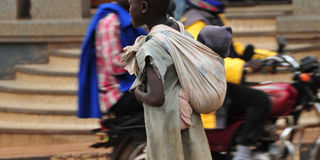Let’s all recommit to ending child violence

Result. A street child carries her sibling on Jinja Road in Kampala on September 24, 2014. Many children end up on streets due to several forms of violence such as emotional, physical or psychological torture back at home. PHOTO BY MICHAEL KAKUMIRIZI.
What you need to know:
- With the end of the Covid-19-induced crisis still out of sight, the onus is upon families as the primary units of society to ensure that children are brought up in a violence-free environment.
In an attempt to stem the spread of Covid-19 that was ravaging the world, President Museveni early last year ordered non-essential services, including all schools, to be closed.
Efforts to reopen schools in a phased manner over the past year have been hampered by the resurgence of Covid-19 cases and deaths. This means that about 15 million children have been at home for the past 18 months.
Besides being a place for children’s education, schools are safe spaces for the mental health and socio-emotional development of these young ones.
Uganda has set a target of vaccinating 550,000 teachers.
By Thursday, only 237,930 of the teachers had received the first dose, with 88,825 having received their second shot.
Government says it will fully reopen the economy only after its targeted population of 21.9 million people has been vaccinated.
This means that basic care needs normally met by schools now fall under families.
While the Covid-19 restrictions have helped to contain the spread of the virus, violence against children has been unleashed.
The World Health Organization defines violence against children as all forms of violence against people under 18 years old.
For infants and younger children, violence mainly involves child maltreatment, that is physical, sexual and emotional abuse and neglect, at the hands of parents and other authority figures.
A study published by this newspaper this week shows that at least 65 per cent of children have suffered violence during the pandemic.
The study, commissioned by six child rights organisations, shows that at least 65.8 per cent of children in Uganda have experienced physical or emotional violence from their caregivers.
In the past, raising a child was the responsibility of the community. But this very community has today turned on these children and preyed on them.
Among the ills these children endure include child neglect, gender-based violence, defilement and early marriage, among others.
With the end of the Covid-19-induced crisis still out of sight, the onus is on families as the primary units of society to ensure that children are brought up in a violence-free environment. Parents should use non-violent means of disciplining their children.
Our communities too need to wake up. At every village, we have structures that include someone to oversee the welfare of the children. These must work with other authorities to ensure that all is in place for children to be safe.
Finally, government should ensure that laws are enforced so that children are safe during the Covid-19 pandemic. Otherwise, we risk destroying our human capital for generations to come.




